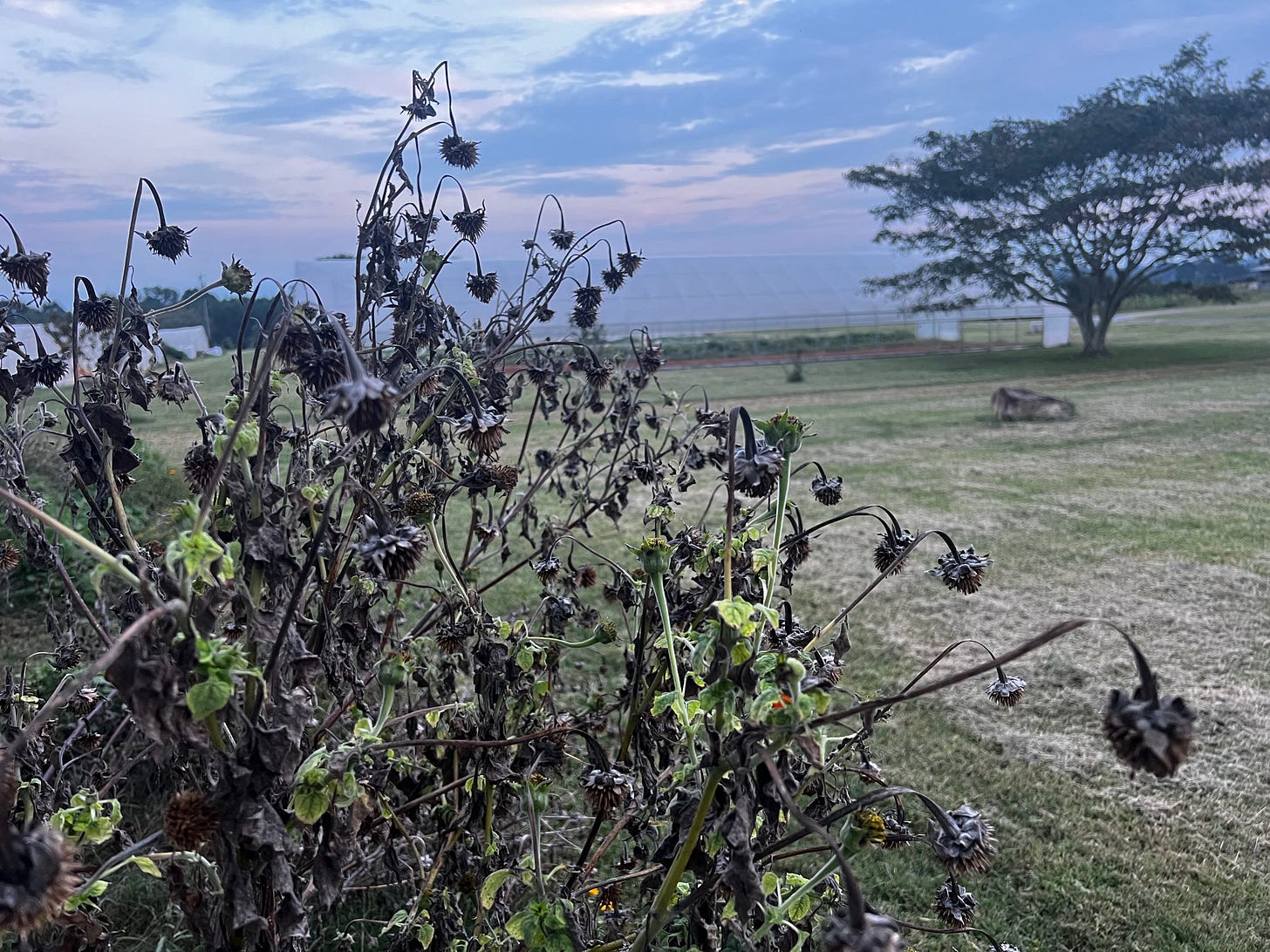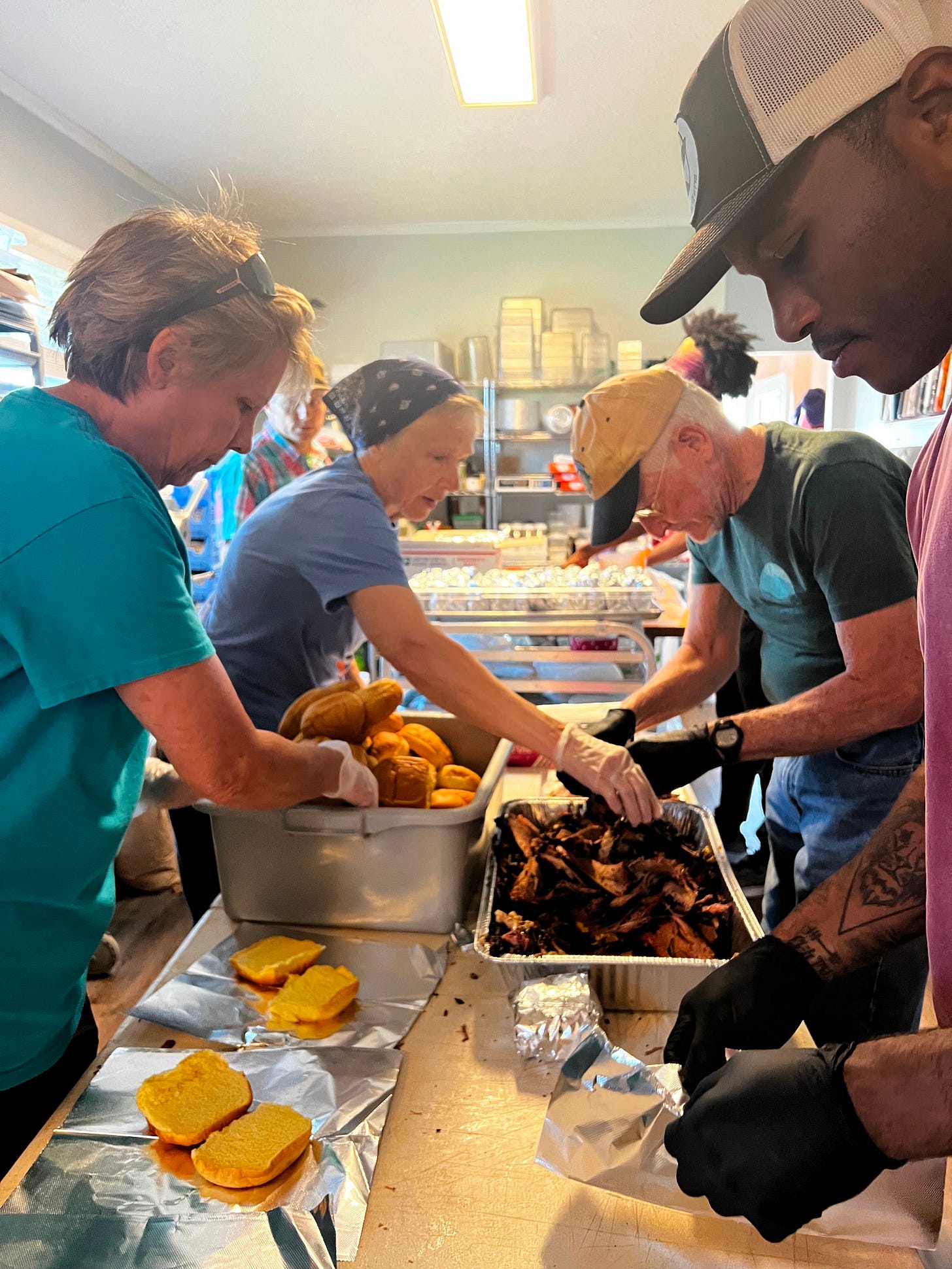Weathering the Storms
or, how we survived the hardest year
By the autumnal equinox, September 22 last year, the tithonia bent downward, dry and brittle and brown, a scarecrow of its former self. In the front garden patch, small golden petals of calendula folded inward, returning to their seed state. It all seems fitting, now that I look back from the blank slate of a new year, on the other side of all that consumed us here in Western North Carolina.
Maybe we should’ve taken more stock of summer, a season marked by existential crisis (mine), marital strife (ours), and days on the farm that mounted slowly with tension. Things felt off. We chalked up the low moods and prolonged silences of the farm team to the heat and stress of summer work. Everyone teeters on the edge of sanity during this brutal season.
We checked in, but everything was, “Fine.”
In our home, a chasm widened between Jamie and me, spurred by an explosive rupture in early June that dragged across the summer months, hulking and suffocating. Any attempt at communication with one another ended in misunderstanding and deep frustration. Silence felt like the better option, easier than running into another brick wall of confusion and hopelessness. We danced around the tension by engaging with the people who came to work with us everyday in hopes that no one would notice the distance between us.
Meanwhile, high market season demanded our labor. We worked sun-up to sundown. I woke every Friday in dread, knowing exactly what lay in front of me: an 18-hour workday, followed by three hours (or less) of sleep, a 3am wakeup, and Saturday market. The hummingbird of anxiety thrummed in my chest. I nurtured it with large-mouth gulps of coffee.
My own existential crisis– what am I doing in a job that takes every minute of my time, but leaves me and my bank account nothing to show for it?– coupled with the strain of my most intimate relationship, the place where I look for safety and guidance through the existential muck, made basic tasks doubly hard. I’d crimp pie shells, tears streaming, and think, “Is this what a nervous breakdown feels like?” Sometimes my internal struggles would make me well with tears at line-up, or cry at the baking table with a person across from me.
The thing about living where you work and working where you live is there is no separation. The personal bleeds into the professional, and soon, any boundaries are subsumed by work and more work. It’s hard to define where one role ends and the other begins. The plot gets lost and we lack the luxury of ample space to return to each other before the next wave of work hits. We press on and make the little money we make, or we struggle further. In the best of times, it feels breathless, like running far and fast. At its worst, like drowning.
Days before Hurricane Helene arrived, our longest running farm employee quit. The person in whom we had invested the most time and attention, whose presence and work were part of the farm’s fabric, left feeling undervalued and aggrieved. We all shed tears at the farm lunch table and hurtful admissions left us questioning our purpose and the culture we built with so much heart and intention. This was a young person we believed in and admired, the person whose art hung on our walls, the person for whom we’d grab the small fork from the kitchen drawer because it was their favorite utensil. This was the closest to a breakup I had felt in years.
The morning after this stinging departure was gray and somber as Helene made her way into the region. Jamie worked alone, adrift in his own reflections. The Cranberries’ “Ode to My Family”wafted through the bakery thanks to my own self-flagellating playlist. A soft, gentle mist outside grew into a steady shower. On Instagram, a friend posted a video of the French Broad River lapping at her fenceline. Shortly after, it had reached the doorstep of her home. I knew the storm was coming, but whether I was preoccupied with present circumstances or unaware of the looming disaster, I’m not sure.
Helene blew onto the farm just before 6am on a Friday with wind that made the windows whistle and lashings of rain like nails running down the laminate panels of our home. The silver maple tree in our front yard bobbed up and down, left and right, possessed by the wind. The rain ran sideways to fill up gulleys, knocking down trees and power lines in our neighborhood. Further up the mountain, it turned the French Broad River into a calamitous rage.
In many ways, we were lucky. No structural damage to the farm. No flooding. We lost power for five days, a drop in the bucket compared to the news slowly trickling down the mountain: No power. No water (a deprivation that would plague Asheville residents for 53 days). Loss of all communications. Videos emerged of entire homes being swallowed, farms completely submerged, people stranded in their hollers, roads and bridges washed away.
On the farm, plants bolted from the stress of the storm. We would lose all of our Asheville restaurant business, about 50% of the farm’s income. In the grand scheme, we had a home and able hands. We scrapped melancholy for action.
A friend and I took to social media and raised mutual aid funds. We went to Costco and Home Depot and filled shopping carts with supplies— toilet paper, shovels, feminine hygiene products, work gloves, water, contractor bags, and food. For a week after the storm, Jamie and I orchestrated supply runs up the mountain and hot meals in our community for folks in need. We turned the bakery into a bbq sandwich making assembly line and delivered to mutual aid hubs that tethered people to vital information and resources. Nothing else mattered in that moment when so many had lost so much. Our own internal disasters paled in comparison.
In the aftermath, Jamie returned to farm work with one less employee, followed shortly by the departure of a part-timer who quit via text message (smh). The farm-bakery lost its Asheville-based employee who was permanently displaced by the storm. October marks the beginning of the holiday baking season and we entered at a deficit.
In some ways, the rearranging of our priorities toward community care relieved some of the aching tension in our relationship. The aftermath of the storm, however, exacerbated financial tensions. By this time, minus the one employee who came in one day a week, Jamie worked alone. Though he would never classify himself in this way, there was an aimlessness that hinted at how diminished he felt. The only unifying thought we shared was to “Get through it.” And that’s what we did.
With all the farm loss, I knew the bakery would need to have a big holiday season. I gave pep talks to myself and the remaining baker on staff fortifying us for an unrelenting season: “It’s gonna be hard and fast. We can do anything for six weeks.” And that’s what we did.
Jamie jumped in to help, as he always does. There are no feelings in work, he says, and maybe that’s why this is his chosen default. We made it through Thanksgiving and rested for a brief moment. We didn’t fight. By December, we kept our heads down in a sort of tacit agreement to put the year behind us.
Our final shift of the year arrived almost three months to the day of the autumnal equinox. The last bakery push of the season began on a Friday morning at 8:30am and ended 36 hours later, Saturday night at 8pm. I slept maybe two hours and Jamie snuck a 30-minute rest somewhere between the buzzing of timers that woke him when the oven needed a turn. Shifts like this one are marked by milestones: We made it out of the house. We completed the first drop. We set up at the market. We completed the second drop. We made it to the end of the market. We got the car loaded. We are headed home.
At the end of that bonkers shift, we landed at the Waffle House in Gastonia, delirious and starved, but intact. We clinked our coffee mugs together and woofed down our plates of hashbrowns and egg sandwiches. No doubt weary, but together at the end of it all.



AHHH BEAUTY. I love you so fucking much. Not only a poignant reflection on the tender human condition (❤️🩹😭💦) this essay is also an important archive of an inflection point in history. thank you 🙏🏻
So moving, so powerful. The storms inside and outside, the home-work challenges, the catastrophes piling up, you wrote us into your heartbreaking season with eloquence and it means so much to read this. I am so grateful to read this hard story, told with truth and beauty.